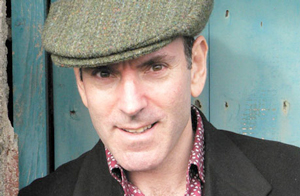by Daniel Hathaway
One-act
Also in contrast to grand opera, one-acts can thrive with a slim personnel roster. Saturday’s shows called for only four singers, a clarinetist, and a tag-team of pianists who more than filled the small theater with sound and created two very different but equally riveting dramatic situations.
At intermission, a colleague mused whether Orpheus and Euridice was an opera or a dramaticized song cycle. Gordon himself (pictured above) describes it as a “Song Cycle in two acts”. Written in 2005 on commission from clarinetist Todd Palmer and premiered at Lincoln Center, the work refashions the Greek legend into a remembrance of Gordon’s partner, who died of AIDS. In a note, the composer says, “When we go through the loss of a loved one, we see them everywhere, feel them in the room, relive our memories — and they can come back to us through stories and music, even if only for brief moments.”
Gordon’s original concept included a narrator (here, soprano Lara Troyer), a clarinetist (Daniel Gilbert) and a pianist (Donna Lee). Since its debut, the piece has been performed in a number of venues and configurations. For Nightingale, director Laura Portune set the action in a living room and added two silent actors, Grant Cole (Orpheus) and Rachel Ruggieri (Eurydice). Even Gilbert (who worked this show into his busy schedule with CityMusic Cleveland last week) got to spend a few moments interacting with the three other characters.
Gordon’s wistful and mostly consonant music expressively underlined Troyer’s monologue as a dreamy succession of scenes unfolded: boy meets girl, they go through illness and death, visit the underworld and journey back. Though Gordon’s disjunct vocal writing is sometimes at odds with intelligibility — supertitles would have helped us understand what was going on — Troyer brought out the meaning of the words as well as anyone could and sang with an engaging, robust tone. Daniel Gilbert sounded predictably superb and had a fine musical partner in Donna Lee. Their ensemble never faltered even though the two were often on opposite sides of the stage.
Orpheus and Eurydice — both played by theater majors at Kent — supplied sometimes mysterious pantomime and interacted in various ways with the narrator. Orpheus had his own clarinet and adroitly mimicked some of Gilbert’s playing.
Less ambiguous in its deep inner meaning was the second title. Hoiby’s The Scarf is based on Chekov’s story The Witch and involves a rather ineffective sorceress (Miriam, played by Diana Farrell) whose spells don’t always work. Bored with her old husband Reuel (tenor Timothy Culver), she lures a young postman (John Pickering) into her remote farmhouse during a blizzard and guarantees his return by giving him a red scarf. The scarf ends up returning, but around the neck of Reuel, thoughtfully returned by the postman.
Diana Farrell brought a fine dramatic sense and a wide range of vocal qualities to her role as the witch. One startling moment came when she tore a skein of yarn limb from limb in a rage. Tim Culver made a marvelously cranky husband, bringing more vocal power to the role than was probably needed in such a small hall. Though physically unconvincing as the young postman, John Pickering’s expert acting and blustery singing held one’s attention. Judith Ryder’s long experience in filling in for opera orchestras on the keyboard was evident in her accomplished reading of Hoiby’s complex score.
Portune staged The Scarf in the same living room that had served Orpheus and Eurydice, but with the addition of a kitchen bench and a few other alterations. If the singing and acting is good in chamber opera, sets and scenery tend to fade into the background, as they did on Saturday afternoon.
Nighingale Opera Theatre’s next venture on August 3 & 4 is Massenet’s Werther. Based on all the good qualities that were in evidence on Saturday, that will be a show to look forward to.
Published on ClevelandClassical.com March 12, 2013
Click here for a printable version of this article.


